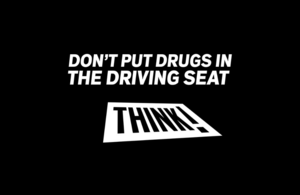THINK! launches first drug driving campaign in a decade
We’re determined to tackle this growing issue as part of our upcoming Road Safety Strategy, which will set out how we make our roads safer for everyone.

- first THINK! drug driving campaign in a decade warns of the risks and consequences of drug driving
- police are working alongside THINK! over the festive period, where cases of drug driving typically spike across England and Wales
- part of the government’s ongoing work to tackle drug driving
The first drug driving campaign in a decade launches today (24 November 2025), by government backed ‘THINK!’ to remind people that one poor decision can have devastating consequences.
The campaign aims to stop the rise in cases and prevent more tragedies on our roads.
Teaming up with police enforcement operations, new adverts running online will target drug driving ‘hotspots’ across England and Wales using police data.
This campaign targets young men, as DfT statistics show that around 90% of drivers impaired by drugs in collisions are male and 4 in every 10 are aged between 17 and 30 (additional statistics are based on analysis of STATS19 data for collisions with ‘impaired by drugs’ as a contributory factor, 2018 to 2022 data).
The latest data also shows an increase in drug-related collisions over the last 10 years: between 2014 and 2023, there has been a 70% increase in driver fatalities where drugs were present.
With the tagline, ‘Don’t put drugs in the driving seat’, the new campaign video is shot entirely from the driver’s seat with a dynamic rotating camera. The film shows how one reckless choice can spiral into devastating consequences: a car collision, police station visit, facing the judge in court and ultimately ending up behind bars.
Local Transport Minister, Lilian Greenwood, said:
Drug driving destroys lives. To tackle this crucial issue, THINK! are reminding drivers of the dangers and the devastating consequences that come from getting behind the wheel under the influence of drugs.
This innovative campaign sends a clear message: don’t put drugs in the driving seat. We’re determined to tackle this growing issue as part of our upcoming Road Safety Strategy, which will set out how we make our roads safer for everyone.
THINK!’s own survey this year shows 32% of young men (aged 17 to 30) think it is acceptable to drive if they feel fine after taking drugs and 46% of young men say they know someone who drives after taking drugs (THINK! survey, April 2025 with adults 16+ in England and Wales).
Advertising will run throughout December across out-of-home, on social media, including on TikTok, as well as online video and digital audio platforms such as YouTube.
National Police Chiefs’ Council lead for Operation Limit, Chief Superintendent Marc Clothier, said:
Drug driving is incredibly dangerous and puts the lives of your passengers, other road users and yourself at risk. Police officers across the country are stepping up proactive and intelligence-led stops on our roads, so rest assured, if you drive under the influence of drugs or drink, we will catch you.
We’re pleased to be partnering with this new THINK! campaign, which is really impactful and coordinates with our enhanced enforcement of drink and drug driving offences over the December period through Operation Limit. Every year, we convict nearly 27,000 drivers for drug driving, which emphasises the message it will not be tolerated.
RAC head of policy, Simon Williams, said:
We welcome the launch of THINK!’s new anti-drug driving campaign, highlighting the dangers of this very serious problem. Figures from this year’s RAC Report on Motoring show there’s been an increase in the number of people prepared to drive under the influence of drugs, the effects of which can be devastating.
It’s also very concerning to see the government’s data showing such a massive rise in drug-driving related fatalities over the course of a decade. We hope the imminent Road Safety Strategy will take steps to tackle this.
Roads media enquiries
Media enquiries 0300 7777 878
Switchboard 0300 330 3000